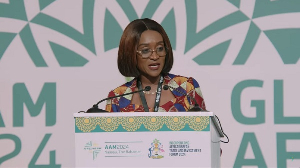 Abena Osei-Asare, Minister of State at the Ministry of Finance
Abena Osei-Asare, Minister of State at the Ministry of Finance
African leaders and economic development stakeholders have been called upon to join forces and address the biases in global economic order, which is having a toll on the Region’s economic outlook.
Over the years, the continent has made notable strides in addressing inequalities in the international economic space, however this feat has suffered a setback, scuttling progress made by Africa.
The region has subsequently been implored to be self-reliant to propel economic progress, anchored by aspirations which are backed by actions and not rhetoric.
To this end, member states have been charged to close their ranks in an attempt to change the narrative of the global economic architecture, which has been detrimental to the region.
The Minister of State at the Ministry of Finance, Abena Osei-Asare, made this remark when she delivered a welcoming address at the opening of the 31st Afreximbank Annual General Meetings (AGM), which held in Nassau, Bahamas recently under the theme “Owning Our Destiny: Economic Prosperity on the Platform of Global Africa,”
According to her, many have pointed to the inherent biases in the global economic order as obstacles to Africa’s efforts. However, reforming the global economic architecture is deeply linked to Africans taking control of their own destiny.
“This requires us to harness the spirit of unity and collaboration to ensure that our economic progress is driven by our aspirations and not merely as an incidental outcome of the economic goals of others,” she stressed.
The event brought African and Caribbean heads of states, ministers and others from diaspora together on how the two regions can forge economic partnerships for development. The event also brought into spotlight challenges hampering economic development in these regions.
She told participants at the meeting that much as Africa has made notable strides in global economic order in recent years, it has equally often suffered setbacks, a challenge she said it sometimes fueled a certain Afro-pessimism and undermined the progress.
Equating the current global trade biases challenge to historical antecedent, the Ghanaian Finance Minister of State, disclosed that the trade bias sentiments take the continent back to the era of 1900 Pan African Conference and the 1919 Pan African Congress
She therefore rallied the continent to ride on what she describes as “the enduring ties” among member states to work together in the areas of commerce and investment and a major pillar of this bridge is the Annual African Caribbean Trade Investment Forum, first held in Bridgetown Barbados in 2022.
On the rationale behind the forum, the Minister of State, disclosed that the gathering, under the auspices of Afreximbank, seeks to strengthen ties between the private sectors of the two regions (Africa and the Caribbean) to advance trade, thus in investment and economic transformation.
Touching on strides made by Afreximbank in the last one year, Abena Osei-Asare announced that the net income of the bank has increased from USD$455.3m to USD761.1m, representing 66% growth, adding that shareholders’ equity also witnessed a significant upsurge of 17.55% also from US$6.1billion, bolstered by US$349.8million in new equity contributions.
Meanwhile the Board of Afreximbank is proposing to return part of the value generated by the Bank to Shareholders through a dividend declaration of US$264.6 million, up from the US$159.3 million declared last year.
The proposed dividend is equivalent to a 35 percent payout ratio, which is a level maintained from last year. In line with the resolution taken at last year’s Annual General Meeting, an additional special dividend for the concessionary financing window, amounting to US$50 million, is also proposed, which is at the same level approved last year.
She further extended her deepest appreciation on behalf of Afreximbank Shareholders for their support and capital investments and urged all to continue to do more.
Abena Osei–Asare reiterated that even more compelling is the fact that these impressive financial results have been accompanied by significant developmental impacts.
She hinted that Afreximbank’s strategic investments have enabled several countries to navigate recent financial crises.
This according to her highlights the importance of a strong African development institution and underscores the importance of continued capital support and safeguarding its success.